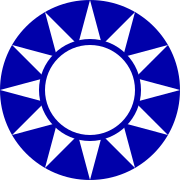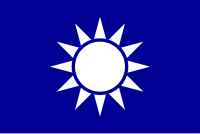
Back Kuomintang Afrikaans الكومينتانغ Arabic الكومينتانج ARZ Kuomintang AST Homindan Azerbaijani Kuomintang BCL Гаміньдан Byelorussian Гоминдан Bulgarian Kuomintang Breton Kuomintang BS
Partai Nasionalis Tiongkok 中國國民黨 Zhōngguó Guómíndǎng Chungkuo Kuomintang | |
|---|---|
 | |
| Singkatan | KMT |
| Perdana Menteri | Sun Yat-sen (Abadi) |
| Direktur Jenderal | Chiang Kai-shek (Pemimpin Abadi)[1] |
| Ketua | Eric Chu |
| Sekretaris Jenderal | Justin Huang |
| Dibentuk |
|
| Didahului oleh |
|
| Kantor pusat | No. 232–234, Sec. 2, Bade Rd., Distrik Zhongshan, Taipei City 104, Taiwan [2] |
| Surat kabar |
|
| Wadah pemikir | National Policy Foundation |
| Sayap pemuda | Liga Pemuda Kuomintang Liga Pemuda Tiga Prinsip Rakyat (1938–1947) |
| Sayap Pelajar | Institut Praktik Revolusioner |
| Sayap Militer | Tentara Revolusioner Nasional (1925–1947) |
| Sayap Paramiliter | Kelompok Baju Biru (1932–1938) |
| Keanggotaan (2020) | 345,971[3] |
| Ideologi | |
| Posisi politik | Kanan tengah[21][22][23] ke sayap kanan[a] Historis: Tenda Besar[24][25] |
| Afiliasi nasional | Koalisi Pan-Biru |
| Afiliasi regional | Persatuan Demokrat Asia Pasifik |
| Afiliasi internasional | |
| Warna | Biru Tua |
| Himne | "Tiga Prinsip Rakyat" |
| Yuan Legislatif | 52 / 113 |
| Wali Kotamadya | 4 / 6 |
| Hakim/walikota | 10 / 16 |
| Anggota dewan | 367 / 910 |
| Wali Kotapraja/Kota | 83 / 204 |
| Bendera | |
 | |
| Situs web | |
| www1 | |
^ A: Pada saat ini, posisi politik arus utama Kuomintang adalah kanan tengah, tetapi juga ada anggota yang berposisi sayap kanan.[27][28][29] | |
| Kuomintang | |||||||||||||||||||||||||||||||||||
|---|---|---|---|---|---|---|---|---|---|---|---|---|---|---|---|---|---|---|---|---|---|---|---|---|---|---|---|---|---|---|---|---|---|---|---|
| Nama Tionghoa | |||||||||||||||||||||||||||||||||||
| Hanzi tradisional: | 中國國民黨 | ||||||||||||||||||||||||||||||||||
| Hanzi sederhana: | 中国国民党 | ||||||||||||||||||||||||||||||||||
| Makna harfiah: | Partai "Nasional" Tiongkok | ||||||||||||||||||||||||||||||||||
| |||||||||||||||||||||||||||||||||||
| Singkatan | |||||||||||||||||||||||||||||||||||
| Hanzi tradisional: | 國民黨 | ||||||||||||||||||||||||||||||||||
| Hanzi sederhana: | 国民党 | ||||||||||||||||||||||||||||||||||
| Makna literal: | Partai Nasional | ||||||||||||||||||||||||||||||||||
| |||||||||||||||||||||||||||||||||||
| Nama Manchu | |||||||||||||||||||||||||||||||||||
| Manchu: | ᠵᡠᠩᡬᠣ ᡳ ᡬᠣᠮᡳᠨᡩᠠᠩ | ||||||||||||||||||||||||||||||||||
| Nama Mongolia | |||||||||||||||||||||||||||||||||||
| Mongolia: | Дундадын (Хятадын) Гоминдан (Хувьсгалт Нам) | ||||||||||||||||||||||||||||||||||
| Nama Uighur | |||||||||||||||||||||||||||||||||||
| Uighur: | جۇڭگو گومىنداڭ | ||||||||||||||||||||||||||||||||||
| Nama Zhuang | |||||||||||||||||||||||||||||||||||
| Zhuang: | Cunghgoz Gozminzdangj | ||||||||||||||||||||||||||||||||||
| Nama Tibet | |||||||||||||||||||||||||||||||||||
| Tibet: | ཀྲུང་གོའི་གོ་མིན་ཏང | ||||||||||||||||||||||||||||||||||
| - Wylie: | krung go'i go min tang | ||||||||||||||||||||||||||||||||||

Kuomintang, atau Partai Nasionalis Tiongkok (disingkat KMT) (aksara Tionghoa tradisional: 中國國民黨; Hanyu Pinyin: Zhōngguó Guómíndǎng) adalah partai politik tertua dalam sejarah modern Tiongkok. Partai ini didirikan oleh Sun Yat-sen, dengan tujuan revolusi melawan Kekaisaran Qing dan mendirikan Taiwan demi adanya pembaruan di Tiongkok. Saat ini, partai ini menjadi oposisi dengan jumlah anggota parlemen terbanyak di Taiwan, bahkan jumlahnya melebihi anggota parlemen dari partai pengusung pemerintah DPP.
- ^ "中國國民黨大事記". 中國國民黨全球資訊網 (dalam bahasa Tionghoa). Diarsipkan dari versi asli tanggal 2009-08-02. Diakses tanggal 2009-07-26.
- ^ "Kuomintang Official Website". Kuomintang. Diarsipkan dari versi asli tanggal 3 Juli 2015. Diakses tanggal 13 September 2011.
- ^ "江啟臣壓倒性勝出 成最年輕國民黨主席 - 中央社CNA". Central News Agency (Republic of China). Diarsipkan dari versi asli tanggal 7 Maret 2020. Diakses tanggal 7 Maret 2020.
- ^ Fenby, Jonathan (2005). Chiang Kai Shek: China's Generalissimo and the Nation He Lost. Carroll & Graf Publishers. hlm. 504. ISBN 978-0-7867-1484-1. Diarsipkan dari versi asli tanggal 5 Februari 2017. Diakses tanggal 28 Juni 2010.
- ^ "Taiwan's 'born independent' millennials are becoming Xi Jinping's lost generation". The Washington Post. 26 Desember 2019. Diarsipkan dari versi asli tanggal 27 Maret 2020. Diakses tanggal 23 Februari 2020.
- ^ "It's Not Techno-Angst That's Driving East Asia to Abandon Nuclear Power". Foreign Policy. 17 Agustus 2019. Diarsipkan dari versi asli tanggal 17 Juli 2020. Diakses tanggal 7 Juli 2020.
In Taiwan, the conservative Kuomintang’s aging demographic base and support for closer ties with mainland China now appears out of touch with a younger electorate increasingly distrustful of China and hostile to reunification.
- ^ "Taiwan's KMT party set to elect new chair amid coronavirus scare". Taiwan News. 4 Maret 2020. Diarsipkan dari versi asli tanggal 10 Juli 2020. Diakses tanggal 7 Juli 2020.
- ^ Glantz, Mickey, ed. (2012). Climate Affairs: A Primer. Island Press. hlm. 65. ISBN 9781597269414. y8zdiN_Z1x0C&pg=PA65. Diarsipkan dari versi asli tanggal 4 Agustus 2020. Diakses tanggal 7 Juli 2020.
- ^ Zarrow, Peter (2021-07-01). "The Chinese Communist Party Has Followed Sun Yat-sen's Road Map". Foreign Policy. Diakses tanggal 2021-10-25.
- ^ Post, Louis Freeland (April 12, 1912). "Sun Yat Sen's Economic Program for China". The Public. 15: 349. Retrieved 8 November 2016.
- ^ 政策綱領. Kmt.org.tw. Diarsipkan dari versi asli tanggal 13 Mei 2019. Diakses tanggal 19 June 2016.
- ^ "Three Principles of the People". Encyclopædia Britannica. Diarsipkan dari versi asli tanggal 26 Oktober 2016. Diakses tanggal 10 Oktober 2016.
- ^ Wright, Mary C. (1955). From Revolution to Restoration: The Transformation of Kuomintang Ideology. Association for Asian Studies. hlm. 515–532.
- ^ "Party Charter". kuomintang. Diakses tanggal 6 September 2021.
...The Party unites as party members all who believe in the Three Principles of the People, both at home and overseas. It abides by the teachings of late National President, the late Director-General, and the late Chairman Chiang Ching-kuo in its wish to bring about ethnic integration, unite the people, revive Chinese culture, practice democratic constitutional government, oppose communism, oppose separatism, and champion the interests of the Chinese nation ...
- ^ Fung, Edmund S. K. (1985). "Anti-Imperialism and the Left Guomindang". Modern China. 11 (1): 39–76. doi:10.1177/009770048501100102. JSTOR 189103.
- ^ Eastman, Lloyd (2021). "Fascism in Kuomintang China: The Blue Shirts". The China Quarterly. Cambridge University Press (49): 1–31. JSTOR 652110. Diakses tanggal 2 Februari 2021.
- ^ Payne, Stanley (2021). A History of Fascism 1914-1945. University of Wisconsin Press. hlm. 337. ISBN 9780299148744. Diakses tanggal 2 Februari 2021.
- ^ Arif Dirlik (2005). The Marxism in the Chinese revolution. Rowman & Littlefield. hlm. 20. ISBN 0-7425-3069-8.
- ^ Von KleinSmid Institute of International Affairs, University of Southern California. School of Politics and International Relations (1988). Studies in comparative communism, Volume 21. Butterworth-Heinemann. hlm. 134.
- ^ Robert Payne (2008). Mao Tse-tung: Ruler of Red China. READ BOOKS. hlm. 22. ISBN 978-1-4437-2521-7.
- ^ "New face for KMT in Taiwan". The Australian. Diarsipkan dari versi asli
 tanggal 9 Januari 2021. Diakses tanggal 26 Desember 2019.
tanggal 9 Januari 2021. Diakses tanggal 26 Desember 2019. The problems for the centre-right KMT in retaining the presidency over the centre-left DPP…
- ^ Qi, Dongtao (11 November 2013). "Globalization, Social Justice Issues, Political and Economic Nationalism in Taiwan: An Explanation of the Limited Resurgence of the DPP during 2008–2012". The China Quarterly. 216: 1018–1044. doi:10.1017/S0305741013001124.
Furthermore, the studies also suggest that the DPP, as a centre-left party opposed to the centre-right KMT, has been the leading force in addressing Taiwan's various social justice issues.
- ^ Shim, Jaemin (2018). "Mind the Gap! Comparing Gender Politics in Japan and Taiwan". GIGA Focus | Asia. German Institute for Global and Area Studies (5). Diarsipkan dari versi asli tanggal 26 Desember 2019. Diakses tanggal 26 Desember 2019.
- ^ Congress, United States (19 April 1947). "Congressional Record: Proceedings and Debates of the ... Congress". U.S. Government Printing Office – via Google Books.
- ^ Laws, United States Congress Senate Committee on the Judiciary Subcommittee to Investigate the Administration of the Internal Security Act and Other Internal Security (19 April 1970). "The Amerasia Papers: A Clue to the Catastrophe of China". U.S. Government Printing Office – via Google Books.
- ^ "Members". IDU. Diarsipkan dari versi asli tanggal 16 Juli 2015.
- ^ Fell, Dafydd (2005). Party Politics in Taiwan: Party Change and the Democratic Evolution of Taiwan, 1991–2004. Routledge. hlm. 98, 117. ISBN 1-134-24021-X.
- ^ Rigger, Shelley (2016). "Kuomintang Agonistes: Party Politics in the Wake of Taiwan's 2016 Elections". Orbis. 60 (4): 408–503. doi:10.1016/j.orbis.2016.08.005. Diarsipkan dari versi asli tanggal 9 Januari 2021. Diakses tanggal 27 Mei 2020.
Instead of reshaping its priorities to fit the expectations of a changing society, the KMT (at least for the moment) seems to be doubling down on its self-marginalizing approach. The new party chair is Hung Hsiu-chu, the erstwhile presidential candidate whose far-right views made it necessary to replace her.
- ^ Yoshiyuki Ogasawara (12 Desember 2019). "Taiwan's 2020 Presidential Elections". The Diplomat. Diakses tanggal 12 Februari 2021.
These supporters, called 'Han maniacs,' elevated Han to presidential nominee. Ultimately, though, they were a minority, possibly some twenty percent of the overall electorate, and Han’s political position, friendly to Beijing and inclined to right-wing populism, started to erode his support.